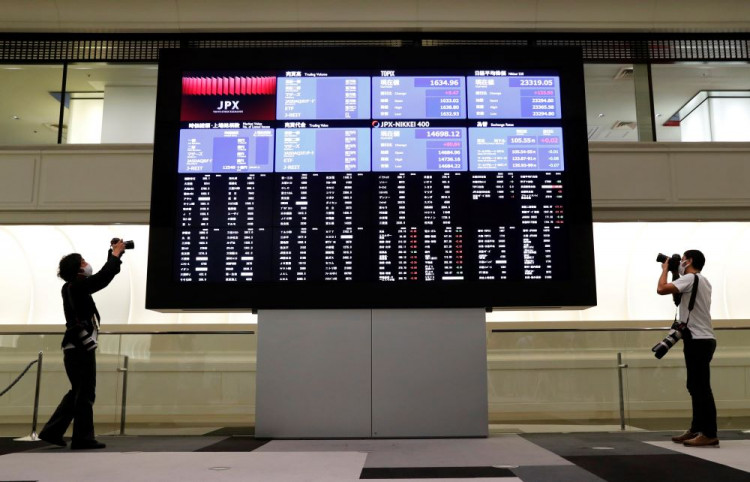Stocks in Asia fell Friday, following on from selloffs in the United States and Europe as investors feared the economic effect of an accelerating rise in coronavirus infections.
The U.S. has reported fresh daily records for new COVID-19 case hospitalizations this week, prompting cities and states, including Chicago, Detroit and California, to reimpose public health restrictions.
European officials have also warned against complacency and said measures to control infections must continue despite hopes that vaccines under development could help to slow the spread of the novel coronavirus.
U.S. Federal Reserve Chair Jerome Powell said Thursday during a discussion with other central bankers that progress in developing a coronavirus vaccine was welcome news but that near-term economic risks remain as infections accelerate, underscoring the likely need for additional government stimulus.
MSCI's broadest index of Asian shares outside Japan dipped 0.25% in early trade as shares across the region stumbled.
Chinese blue chips led losses, falling 1.21%. Australian shares lost 0.47%, Seoul's Kospi was down 0.16% and the Hang Seng was 0.55% lower. Japan's Nikkei 225 fell 0.95%.
Some investors saw a buying opportunity in the slump.
"My view is this is the dark just before dawn," said Michael Frazis, portfolio manager at Frazis Capital Partners in Sydney.
"You've got the second wave of coronavirus, new sets of shutdowns, clear problems around the world, travel dropping off again...But at the same time, we have the strongest possible evidence that we do have a vaccine and many people will be vaccinated over the next few months."
"We think this is all actually very positive and it's actually a good time to be investing in markets," he said.
Frazis said many risks nevertheless remained for short-term traders amid ongoing uncertainty over issues like the U.S. stimulus response.
On Thursday, top Democrats in the U.S. Congress urged renewed negotiations over a multitrillion-dollar coronavirus aid proposal, but the top Republican immediately rejected their approach as too expensive, continuing a monthslong impasse.
Wall Street dropped Thursday in broad selling.
The Dow Jones Industrial Average fell 1.08%, pulled lower by industrial and financial companies sensitive to economic growth. The S&P 500 lost 1.00% and the Nasdaq composite dropped 0.65%.
U.S. Treasury yields also sank Thursday, weighed down by the persistent rise in coronavirus cases and data showing inflation remained benign in the world's largest economy. The U.S. yield curve, viewed in part as a gauge of risk appetite, also flattened.
On Friday, U.S. yields continued to tick lower, with benchmark 10-year Treasury notes yielding 0.8766%, compared to a Thursday close of 0.886%.
"Bond yields, which had been flirting with the 1.0% level in terms of the U.S. 10-year Treasury, have...snapped back sharply in terms of yield," Rob Carnell, Asia Pacific head of research at ING said.
"That move most likely got a further nudge from the softer-than-expected U.S. inflation data for October which were released yesterday, and which tally with a weaker economic reality."
Rising risk aversion lifted the safe-haven yen, with the dollar dropping 0.18% against the Japanese currency to 104.93. The euro was flat in Asian morning trade and the dollar index ticked 0.2% higher to 92.987.
An unexpected rise in U.S. crude stockpiles exacerbated virus-linked economic fears in commodity markets, pushing U.S. crude 1.63% lower to $40.45 per barrel.
Brent crude dropped 1.45% to $42.90 per barrel. Spot gold gained 0.17% to $1,878.97 per ounce.





